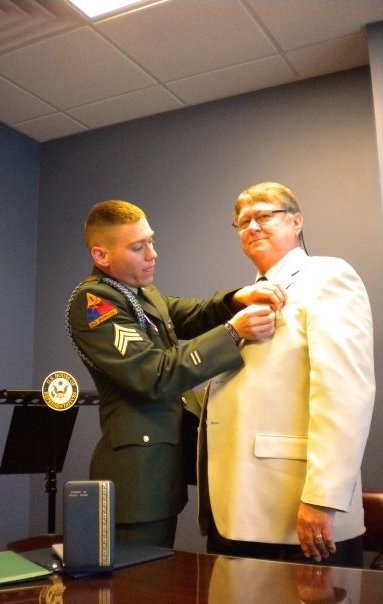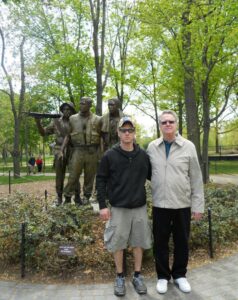by Tom Sileo
Bob Ollis doesn’t like talking about his harrowing experience in Vietnam. To help me understand what later drove his only son to serve in Iraq and Afghanistan, however, Bob decided to make an exception.

“He was very, very proud of having two grandfathers who served and a father who served,” Bob told me. “He always made me feel special (for serving) in Vietnam.”
Bob’s son is U.S. Army Staff Sgt Michael Ollis, who is the subject of my new book I Have Your Back. As I researched Mike’s life while going through old scrapbooks at the Ollis family home in Staten Island, New York, it quickly became apparent how much Mike wanted to be like his dad.
“You see, my dad was in the Army when it wasn’t the cool thing to do. When other guys his age were dodging the draft or enrolling in college just to get out of service, he pushed up his military duty before even being drafted,” Mike wrote while serving in his high school’s junior ROTC program. “He became a soldier and served valiantly for his country. He fought in Vietnam and received the Purple Heart for wounds received. My father thought it was a privilege to serve the country he lives in and now, so do I.”
Bob had long been haunted by the events of February 29, 1968, in Hue City, Vietnam. Not only was he seriously wounded by shrapnel during one of the war’s bloodiest battles, but a fellow soldier he tried so valiantly to save wound up succumbing to his wounds.
More than 40 years after the Tet Offensive, Bob’s son returned from Iraq just in time to pin a long overdue Bronze Star on his father’s chest.
“It was nice,” Bob told the Staten Island Advance after the ceremony. “But the bitter part was why I got it. I would have given up this award to have this guy still be alive.”
Like many fellow Vietnam veterans, Bob harbored significant anger toward the Vietnamese after surviving the war. It wasn’t until speaking with Mike about his similar experience in Iraq that Bob finally experienced an epiphany.
“How did it feel to go over there and get the bad guys?” Bob asked his son.
“Oh Pop,” Mike said softly. “You can’t hate everybody. There’s bad apples, for sure, but not all of the people there were bad.”
“You’re right, Michael. Come to think of it, the Vietnamese people I met over there weren’t all bad,” he told his son. “I shouldn’t dislike them.”
After Mike returned from his second combat deployment—this time to Afghanistan—it was his dad who helped him cope with similar battlefield trauma after losing six fellow soldiers.
“What if I had gotten there sooner, Dad?” Mike said. “What if we could have saved even one of those six guys?”
“You had to make sure the base was secure first, right?” said Bob, having been through similar scenarios in combat. “There was nothing else you could have done.”
“Michael, I’ll help you in any way I can, but you need to find a way to move forward,” Bob continued. “What other choice do we have? What’s done is done.”
From that point forward, Mike resolved to use the tragic attack as a learning experience in case he and his fellow soldiers ever became caught in the middle of another attack on a coalition base. After all, his third combat deployment was coming up.
One of the last things Mike did before once again leaving for Afghanistan was to visit the Vietnam Veterans Memorial in Washington, D.C. Along with the 9/11 terrorist attack that Mike witnessed in his home city as a child, nothing shaped his desire to serve more than the heroism of his father and fellow Vietnam veterans.
The moment Mike had spent much of his life preparing for would arrive at Forward Operating Base Ghazni on August 28, 2013. As soon as the base came under attack, Mike’s training—and that conversation he had with his father—immediately kicked in.
Not only did Mike’s entire platoon survive the assault, but so did Polish Army lieutenant Karol Cierpica. During a firefight that followed a massive explosion, Mike encountered Karol on the battlefield and assured him that he would have his back. Moments later, as an enemy suicide bomber charged toward Karol, that’s exactly what Mike did at the cost of his own life.
Just like his father in Vietnam, Mike was willing to make the ultimate sacrifice to save the soldier beside him. Also just like his dad, Mike was awarded a Bronze Star and Purple Heart. He would also posthumously receive the Silver Star, which was later upgraded by the U.S. Army to the Distinguished Service Cross.

“It’s painful to relive it. I’ve been approached by many people who say ‘how the hell do you do it’ and I don’t know,” Mike’s proud father said at the Distinguished Service Cross ceremony. “But I think like Karol, through the tears, we have to tell the story of Karol and Michael. They just locked arms and followed each other.”
Through those same tears, we must also tell the story of a father and son who volunteered to serve our country during three American wars. Just as Mike made Bob “feel special” for serving in Vietnam, all of us should do our best to make this current generation of American veterans feel the same way.
“Every generation has its heroes,” said U.S. Army Gen. James McConville. “Michael Ollis is one of ours.”
I Have Your Back: How an American Soldier Became an International Hero will be published by St. Martin’s Press on June 4, 2024.

Tom Sileo has authored or co-authored six military non-fiction books about heroes of America’s post-9/11 wars in Afghanistan and Iraq. Those titles include Three Wise Men; Tom’s widely praised 2021 collaboration with combat veteran and Gold Star brother Beau Wise. Tom is a contributing senior editor of The Stream and a recipient of the Marine Corps Heritage Foundation’s General Oliver P. Smith Award for distinguished reporting. He is a graduate of Rutgers University and lives in Delray Beach, Florida.
